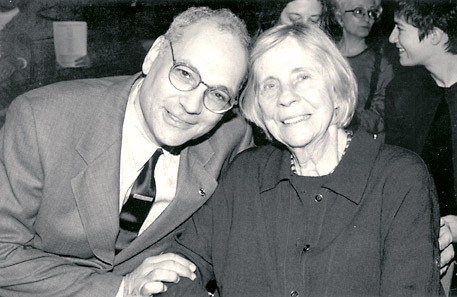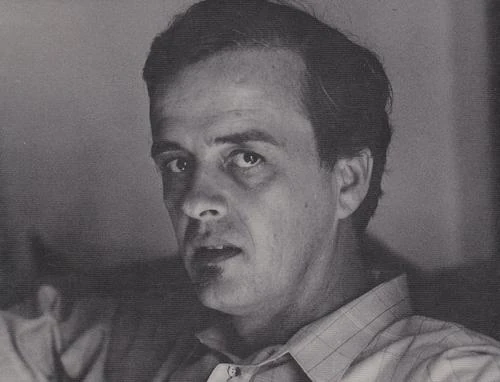
Sideman

Sideman
/https%3A%2F%2Fdev.lareviewofbooks.org%2Fwp-content%2Fuploads%2F2021%2F04%2Fasleepandawake.jpeg)
Canicule Macaronique
Heureux ceux qui ont la clim—Corse-Matin (6.8.94)
We think of lifetimes as mostly the exceptional
and sorrows. Marriage we remember as the children,
vacations, and emergencies. The uncommon parts.
But the best is often when nothing is happening.
The way a mother picks up the child almost without
noticing and carries her across Waller Street
while talking with the other woman. What if she
could keep all of that? Our lives happen between
the memorable. I have lost two thousand habitual
breakfasts with Michiko. What I miss most about
her is that commonplace I can no longer remember.

A Brief for the Defense
Sorrow everywhere. Slaughter everywhere. If babies
are not starving someplace, they are starving
somewhere else. With flies in their nostrils.
But we enjoy our lives because that’s what God wants.
Otherwise the mornings before summer dawn would not
be made so fine. The Bengal tiger would not
be fashioned so miraculously well. The poor women
at the fountain are laughing together between
the suffering they have known and the awfulness
in their future, smiling and laughing while somebody
in the village is very sick. There is laughter
every day in the terrible streets of Calcutta,
and the women laugh in the cages of Bombay.
If we deny our happiness, resist our satisfaction,
we lessen the importance of their deprivation.
We must risk delight. We can do without pleasure,
but not delight. Not enjoyment. We must have
the stubbornness to accept our gladness in the ruthless
furnace of this world. To make injustice the only
measure of our attention is to praise the Devil.
If the locomotive of the Lord runs us down,
we should give thanks that the end had magnitude.
We must admit there will be music despite everything.
We stand at the prow again of a small ship
anchored late at night in the tiny port
looking over to the sleeping island: the waterfront
is three shuttered cafés and one naked light burning.
To hear the faint sound of oars in the silence as a rowboat
comes slowly out and then goes back is truly worth
all the years of sorrow that are to come.
with Gerald Stern, San Francisco (1950)
The Great Fires
Love is apart from all things.
Desire and excitement are nothing beside it.
It is not the body that finds love.
What leads us there is the body.
What is not love provokes it.
What is not love quenches it.
Love lays hold of everything we know.
The passions which are called love
also change everything to a newness
at first. Passion is clearly the path
but does not bring us to love.
It opens the castle of our spirit
so that we might find the love which is
a mystery hidden there.
Love is one of many great fires.
Passion is a fire made of many woods,
each of which gives off its special odor
so we can know the many kinds
that are not love. Passion is the paper
and twigs that kindle the flames
but cannot sustain them. Desire perishes
because it tries to be love.
Love is eaten away by appetite.
Love does not last, but it is different
from the passions that do not last.
Love lasts by not lasting.
Isaiah said each man walks in his own fire
for his sins. Love allows us to walk
in the sweet music of our particular heart.
Joyce's Ulysses

Non Est . . .
 I
I
In the Grolier Bookshop, Harvard Square (1965)
Entries
When I think no thing is like any other thing
Heavy Violets
Heavy violets there is no way
if the door clicks the cushion 
Napoleon's hat is an obvious choice I guess to list as a famous hat, but that's not the hat I have in mind. That was his hat for show. I am thinking of his private bathing cap, which in all hon- esty wasn't much different than the one any jerk might buy at a corner drugstore now, except for two minor eccentricities. The first one isn't even funny: Simply it was a white rubber bathing cap, but too small. Napoleon led such a hectic life ever since his childhood, even farther back than that, that he never had a chance to buy a new bathing cap and still as a grown-up--well, he didn't really grow that much, but his head did: He was a pin- head at birth, and he used, until his death really, the same little tiny bathing cap that he was born in, and this meant that later it was very painful to him and gave him many headaches, as if he needed more. So, he had to vaseline his skull like crazy to even get the thing on. The second eccentricity was that it was a tricorn bathing cap. Scholars like to make a lot out of this, and it would be easy to do. My theory is simple-minded to be sure: that be- neath his public head there was another head and it was a pyra- mid or something.

POEM TO SOME OF MY RECENT POEMS
My beloved little billiard balls,
my polite mongrels, edible patriotic plums,
you owe your beauty to your mother, who
resembled a cylindrical corned beef
with all the trimmings, may God rest
her forsaken soul, for it is all of us
she forsook; and I shall never forget
her sputtering embers, and then the little mound.
Yes, my little rum runners, she had defective
tear ducts and could weep only iced tea.
She had petticoats beneath her eyelids.
And in her last years she found ball bearings
in her beehive puddings, she swore allegiance
to Abyssinia. What should I have done?
I played the piano and scrambled eggs.
I had to navigate carefully around her brain’s
avalanche lest even a decent nale be forfeited.
And her beauty still evermore. You see,
as she was dying, I led each of you to her side,
one by one she scorched you with her radiance.
And she is ever with us in our acetylene leisure.
But you are beautiful, and I, a slave to a heap of cinders.
from. Greatest Hits 1966–2003. Pudding House Press (2004)
Eager to make my mark on the literary landscape, I got busy finding the mentors who would teach me in lieu of the college education I could not afford. As a result, I have developed a style composed of styles sometimes waxing traditional, harking to the neoformalists, but most of my poems are written in a sometimes frenetic, sometimes lyrical free verse, dotted with literary, musical, and cinematic allusions, accented with smatterings of German, Latin, Spanish, and Yiddish, and neologisms, and rife with various cants and jargons, as they capture my interest, from the corporate roundtables to the streets.
from Pansies THE WHITE HORSE The youth walks up to the white horse, to put its halter on and the horse looks at him in silence. They are s...